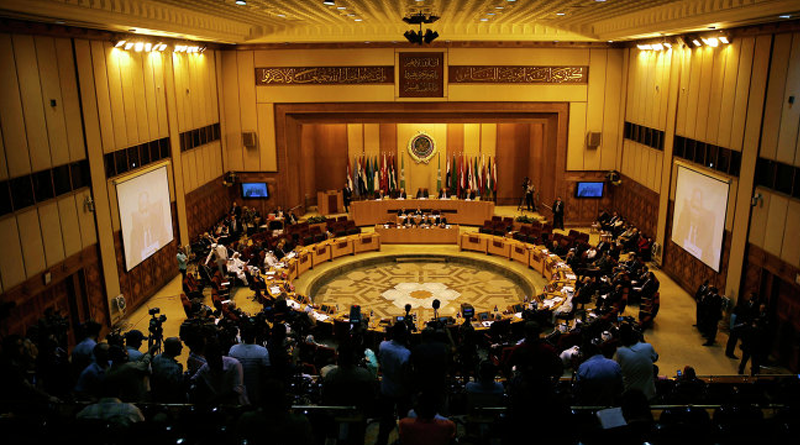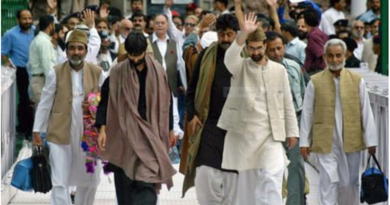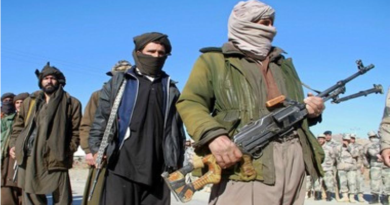Syria’s Expulsion from Arab League could be a prelude to US/NATO intervention in Syria
The Arab League has expelled Syria, apparently on account of the Syrian government’s brutal crackdown on anti government demonstrators. This is very significant move and dangerous consequences could follow. One has to take a fuller view of reality to grasp the political meaning of this move. Seen in isolation, the Arab League’s decisions would otherwise hardly merit attention, coming as they are, from a bunch of client regimes who when they meet each other, mostly talk about women and wine. This decision, however, is a very vital step towards the US strategic designs in the region, and without a tiniest fraction of doubt has been directly dictated by United States. Let us look at the whole picture now:
1) After the dismemberment of Ottoman state in 1923 , the West’s colonial campaign of subjugating Muslim lands continued with the establishment of subservient Arab regimes, and the process reached its culmination when the Zionist entity ‘Israel’ was planted in the strategic heartland of Islam. From that day onwards, strengthening the Zionist entity has been the sole strategic objective of the West’s – and more visibly of the USA’s (it being the political-military leader of the West after WW2) – policies in the region. That is because the Zionist entity was created in the first place to put a final seal on the West-created political order in the region, and functioning as its police post, to perpetuate that order. Unfortunately the West’s designs did not face any sustained and credible resistance, and the Zionist entity went on expanding. Not to speak of surrounding neighbours like Egypt and Syria who put up a brief but unsuccessful fight in 1967, but later caved in with Egypt signing the Camp David accords, the Palestine Liberation Organization – which was founded with the sole aim of reclaiming Palestine – also gave up its rightful claim signing the US-brokered Oslo accords in 1991. Thus it was a cakewalk for the colonial forces, with virtually no resistance to the West’s agenda in the Middle East.
2)The Islamic Revolution of Iran changed the whole picture: in the most basic and wide ranging sense it represented a credible and authentic challenge to the West’s global hegemony, and more specifically a strong voice of defiance against the blatantly pro-Israel agenda pursued by the West. The Islamic Republic took a principled stand against Zionism, and the Zionist entity – and upheld the right of Palestinian refugees to return to the homes they had been expelled from in 1948. The Islamic Republic opposed all the so-called peace moves/processes which only sought to legitimize the Zionist entity while giving empty promises to Palestinians. With Hamas in Gaza and Hizbollah in Lebanon, Israel for the first time, came across a new force, namely, the Islamic Movement, and as we witnessed in 2006 in Lebanon, and 2008 in Gaza, it suffered a humiliating defeat, and the myth of its invincibility owing largely to its victory in previous wars, came crashing down. The Islamic Movement has now become the main reality of the region while the PLO has been exposed as a bunch of treacherous thugs.
3)Things have moved much further, with the current uprisings in the Arab world changing the strategic landscape of the region. With Zionist collaborators like Hosni Mubarak of Egypt no longer around, Israel is headed for extremely difficult times. The peoples’ uprisings in the Middle East and North Africa are a very significant phenomenon. These uprisings are not, in a narrow sense of the term, engineered by Iran but are definitely inspired by the message of Islamic Revolution which in turn is going to decisively influence their future outcome. The Islamic Republic and its political role has already started shaping the political landscape of the region, leading to the emergence of a resistant politics, resisting the West-backed pro-Zionist agenda, as opposed to conformist politics which had hitherto dominated the political landscape and because of which the Zionist agenda had a free hand. As a result we now have a resistant politics represented by Islamic Movement led by the Islamic Republic of Iran, and a conformist politics represented by client Sheikhdoms led by the British created tribal clan, the Ale-Saud or the Saudi Kingdom. The former consider the Zionist entity as the source of all insecurity and instability in the region, whereas the latter consider Iran as the main ‘evil’ in the region.
4) As it follows from above, promoting the pro-Zionist agenda effectively means acting against the Islamic Movement and particularly its leading edge; the Islamic Republic of Iran. This is exactly what the West – in collaboration with its client regimes in the region (comprising the conformist camp) – is doing. We need to understand some vital facts here: First, Lebanon is absolutely important in this whole affair. Whether Lebanon remains a part of resistant politics, which it is now, or becomes a part of conformist politics will have a make or break effect on the political future of the region. Lebanon matters to the West in two important and inter-related ways: one, since it borders Israel so, for the security of the Zionist entity it has a crucial importance; two, Hizbollah having firmly established itself as a powerful/dominant player in Lebanese affairs, has deep ideological connections with Iran. Political analysts, when analyzing the costs a possible US invasion of Iran could involve, give much weight to Iran-Hizbollah strategic relationship considering it an important strategic edge Iran has in any conflict with USA/Israel. Second, Syria is absolutely pivotal in determining the political role of Lebanon. There are already Saudi moles like Saad Hariri in Lebanon who want to somehow curtail Hizbollah’s dominant position in Lebanese state affairs. If that happens resistant politics will be deprived of its most strategically important element.
5)The present Syrian government like other dynastic dinosaurs deserves to be wound up – and the sooner the better. But there are huge considerations here: it is not Libya or Tunisia. Syrian government is a part of the axis of resistance extending from Iran to Lebanon. Nobody cares about the Assad regime, but the functionality of this axis is a genuine matter of concern. There are clear evidences of brazen Saudi interference in Syria against the Assad regime. This is in sharp contrast to Saudi Arabia’s role in the present uprisings in the Arab world where they have stood against the people and with the tyrants. Zein-ul-Abidin Ben Ali, the ousted dictator of Tunisia is being sheltered by the Saudi Kingdom, Hosni Mubarak was offered refuge by them, Saudi ‘Ulema’- as expected- issued fatwas against public demonstrations, and above all the Kingdom militarily intervened for the regime and against people in neighbouring Bahrain. So what do we conclude from this? There is a foul agenda behind Assad’s removal, much fowler than the Assad regime itself. The people on the streets may not be a party to this, but those who are, are the ones who are calling the shots.
Looking at the whole picture as very briefly described above makes things easy to understand. Why did Arab League have to suspend Syria? Isn’t it a fact that League itself is mostly made up of dynastic dinosaurs? What moral right did the Qatari Sheikh, when announcing the decision of Syria’s suspension before the press, have? Does he know what people, or as the Noble Quran says ‘An-naas’ means? Their opinion; their rights; and their dignity? No, he doesn’t know any of this, nor does he need to know for the decision was directly dictated by the United States through their clients, the Ale-Saud.
Now what is the game-plan? Firstly to isolate Syria, next to build up a case for US/NATO military intervention and after this intervention install a puppet regime and work for political change in Lebanon with a view to pushing Hizbollah to the fringes. All this will be done with the larger aim of depriving Iran of its strategic edge against the USA and Israel, and forcing the Islamic Republic into submission, an objective that has been at the top of the American agenda since the inception of Islamic Revolution in 1979.
About Blogger:
Dr. Syed M. Inayatullah Andrabi is the founder convenor of Mahazi-Islami, Occupied Kashmir. He is an intellectual-political activist from Srinagar, capital city of occupied Kashmir.





Very good attempt at satisfying your Iranian masters on whose pay roll you’ve been for over 3 decades. Throughout your life you preached against the US and UK, but ended up in their lap. May Allah save the Muslims of Kashmir from you and your family’s khair!
That is a very good Analysis of the prevailing situation in Middle East.You have rightly said that neutralizing Syria is the first step towards bringing Iran into submission.
The entire muslim world is divided. The dynastic autocratic unjust rulers have brought shame to muslims. While Syria’s ruler has lost moral authority to continue and should be hounded out of office and persecuted for killings , loot and plunder he and his clan has unleashed I agree that it does’nt behove members of Arab league to meddle. How better are they than the Syrian lunatic ruler? Let them allow Islamic democracy in their countries rather than continue to exploit their poor people.
I would like to extend heart felt thanks and congratulations to you for bringing out such a indepth analysis of syrian politics .
very informative article,on the motivations behind the Arab league’s decision. In The manner in which it has been reported in the media this decision seems like a genuine attempt to support the rights of the Syrian people. However as this article confirms, this decision allows america to fulfil its sinister political goals under the facade of supporting the people of Syria. Can I request the user above to refrain from personal attacks!!!
‘):Rushdie’s so-called blasphemy is the foiibcatran of literalists whose piety can be respected but whose literalism assumes what may not be assumed: that the Creator of the Universe can be diminished by any human agency. Islam, like Judaism, is not an iconic creed (both are famously the opposite), but the philosophers of even such iconic religious expressions as medieval Christianity and classical Hinduism do not locate the divine literally in paint or carving, and that art, while it may for some kindle reverence, cannot be a medium for the soiling of the sacred. Art cannot blaspheme, because it is not in the power of humankind to demean or besmirch the divine.Now, I don’t pretend to be an expert on the subtleties of Islamic theology but I was under the impression idolatry was as much a sin to Muslims as it is for Christians – even if the precise definition is enormously controversial both within, and between, faiths. Perhaps those who scream the loudest about blasphemy would care to ask themselves if Ms. Ozick doesn’t have a point.